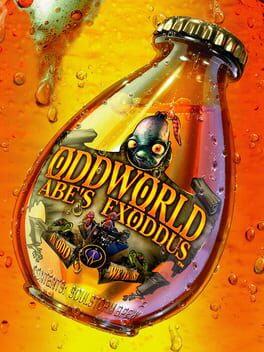Playing Oddworld: Abe's Exoddus recently taught me an important lesson on the value of historical context in videogames. Exoddus was the first Oddworld game I played as a kid, and it fascinated me like no other videogame at the time. The creepy and oppressive industrial setting, the incredible sound design, the beautiful detailed pre rendered backgrounds, and the tense and frightning enemy encounters provided a unique immersive experience that wasn't available on the regular cheeerful and colorful games I was drawn to as a kid.
Eventually I did get around to trying out the first entry in the franchise, Abe's Oddysse, and quickly dropped it due to its lesser user friendly QoL features, like the lack of a quicksave or not being able to control more than one Mudokon at once. For years Exoddus was the game I kept in my mind as the superior game of the two, and it wasn't until very recently when I played both games again from beginning to end when that perception changed.
While Exoddus is the more "enjoyable" of the two, letting you quickave at will and polishing a bunch of mechanics that made Oddysee more frustrating, it doesn't manage to capture the tone, pacing, and atmosphere of the first game as best as it could. While Exoddus is more than eager to introduce a wide variety of new challenges, obstacles, enemies and puzzles, it isn't able to build on the strengths of Oddysee that made it a landmark of cinematic platformers, deciding instead to center its focus on providing a selection of new levels and ideas for the gameplay loop established previously.
Which isn't to say that Exoddus is a bad game. It's not. But the fact that it's described by it's team itself as a "bonus game", does indicate the nature of it's development. Exoddus is very much a "level pack" disguised as a sequel, moving the player from room to room in order to solve the next platforming puzzle, without the level of detail and thought that was put into the first game's presentation and storytelling. There's a vast number of repeated assets and entities that were simply plucked out from the first game in order to expedise the development process. And that's fine.
Exoddus is incredibly fun, pushing the player into solving increasingly more challenging problems that are built on top of simple to understand concepts and mechanics, making one feel very smart for overcoming said challenges. It has a firmer grasp on game design and it is a much more confident puzzle experience than Oddysee. Exoddus is also a much more humorous and cartoony sequel, going so far as to letting you control your own explosive farts, and lending the sequel a sense of levity that distinguishes it from the predecessor's more somber tone.
It's just that Exoddus came after Oddysee. And Oddysee managed to be wholly unique on it's first try, while Exoddus never had the chance to. The things I found to be so captivating and inspiring in Exoddus as a young kid, I now realize exist in Oddysee in a much more cohesive and impactful experience. Cool game tho.
Eventually I did get around to trying out the first entry in the franchise, Abe's Oddysse, and quickly dropped it due to its lesser user friendly QoL features, like the lack of a quicksave or not being able to control more than one Mudokon at once. For years Exoddus was the game I kept in my mind as the superior game of the two, and it wasn't until very recently when I played both games again from beginning to end when that perception changed.
While Exoddus is the more "enjoyable" of the two, letting you quickave at will and polishing a bunch of mechanics that made Oddysee more frustrating, it doesn't manage to capture the tone, pacing, and atmosphere of the first game as best as it could. While Exoddus is more than eager to introduce a wide variety of new challenges, obstacles, enemies and puzzles, it isn't able to build on the strengths of Oddysee that made it a landmark of cinematic platformers, deciding instead to center its focus on providing a selection of new levels and ideas for the gameplay loop established previously.
Which isn't to say that Exoddus is a bad game. It's not. But the fact that it's described by it's team itself as a "bonus game", does indicate the nature of it's development. Exoddus is very much a "level pack" disguised as a sequel, moving the player from room to room in order to solve the next platforming puzzle, without the level of detail and thought that was put into the first game's presentation and storytelling. There's a vast number of repeated assets and entities that were simply plucked out from the first game in order to expedise the development process. And that's fine.
Exoddus is incredibly fun, pushing the player into solving increasingly more challenging problems that are built on top of simple to understand concepts and mechanics, making one feel very smart for overcoming said challenges. It has a firmer grasp on game design and it is a much more confident puzzle experience than Oddysee. Exoddus is also a much more humorous and cartoony sequel, going so far as to letting you control your own explosive farts, and lending the sequel a sense of levity that distinguishes it from the predecessor's more somber tone.
It's just that Exoddus came after Oddysee. And Oddysee managed to be wholly unique on it's first try, while Exoddus never had the chance to. The things I found to be so captivating and inspiring in Exoddus as a young kid, I now realize exist in Oddysee in a much more cohesive and impactful experience. Cool game tho.
